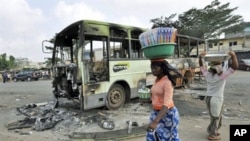African Union officials in Ivory Coast are preparing to report back to a heads-of-state panel charged with resolving the political crisis. Ivory Coast's incumbent government says the mediation shows that West African leaders have failed in their push to promote the internationally-recognized winner of the presidential election.
African Union officials have been in Abidjan this week, meeting with representatives of incumbent President Laurent Gbagbo and the United-Nations-certified winner of November's vote, former Prime Minister Alassane Ouattara.
Those officials will draft a report for review by the leaders of Burkina Faso, Chad, Mauritania, South Africa, and Tanzania, who have been asked by the African Union to come up with a way to resolve Ivory Coast's political crisis by the end of the month.
West African leaders say widespread support for Mr. Ouattara is slipping because some heads of state are now backing Mr. Gbagbo.
"The solidarity that started amongst us and in the international community is fast being eroded because certain countries have taken sides and therefore are disagreeing with the decision already taken," said James Gbeho, who chairs the Economic Community of West African States, or ECOWAS.
Gbagbo advisor Yao Gnamien says the African Union mediation shows ECOWAS has failed.
"The ECOWAS failed to solve the problem. How can they sanction President Gbagbo without listening to him? They were thinking that President Gbagbo has not been elected. Instead of saying that, they should have come to investigate first," said Gnamien.
Gnamien told VOA that the African Union will clearly show that Mr. Gbagbo won re-election.
"The stay of the experts in Cote d'Ivoire will tell all the world what was going on in Cote d'Ivoire after the election, and then we will see whether the president is guilty or not," he said.
But Gnamien says the African Union panel must not question the legitimacy of the constitutional counsel decision that is the basis of Mr. Gbagbo's re-election. The counsel annulled as fraudulent nearly ten percent of all ballots cast, reversing electoral commission results that declared Mr. Ouattara the winner.
It is true that the constitutional counsel is historically the final legal authority on Ivorian elections. But for this vote, under a peace plan signed by Mr. Gbagbo, the United Nations must certify the outcome. U.N. representative Young-jin Choi certified Mr. Ouattara.
Christian Preda led the European Union observer mission to Ivory Coast's election.
"Mr. Choi, the special representative of the secretary general of the United Nations said clearly that the results announced by the electoral commission were the final result and this is, as you know, the position of the international community with some exceptions, the international community accepted this result," said Preda.
One of those exceptions is Russia, which has blocked Security Council resolutions endorsing Mr. Ouattara. In a meeting this week with Senegal's foreign minister, Russian Foreign Minister Sergei Lavrov said the international community must not impose itself on Ivorian democracy.
Lavrov says forced outside interference in the electoral process is absolutely unacceptable and could destabilize all of West Africa. He says the international community cannot create such a bad precedent that could be used every time someone is unhappy with an election.
ECOWAS leaders are considering military force to remove Mr. Gbagbo, and Gbeho says they reserve the right to act independently of any African Union decision.
AU Prepares Report on Ivory Coast Crisis













